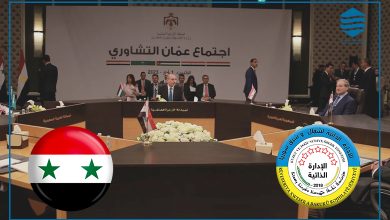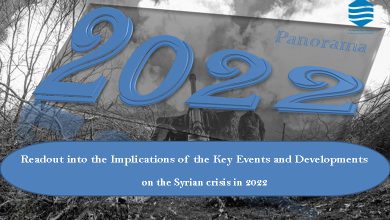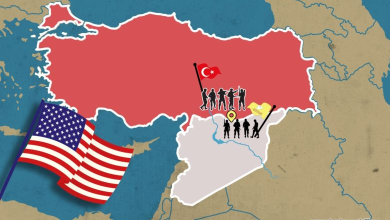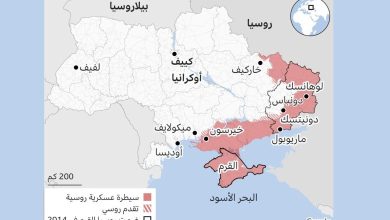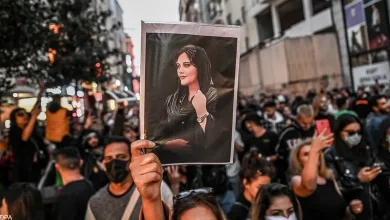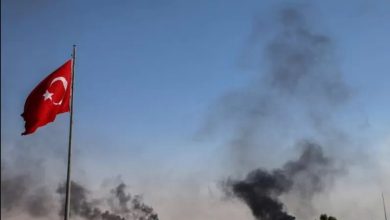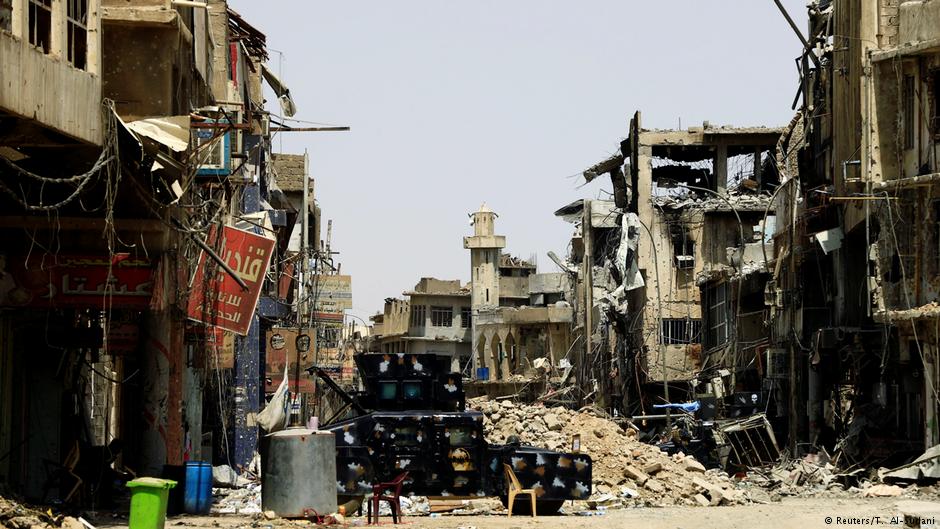
The crisis of Syria and the region … visions and options
Translated by: Hozan Hadi
Also available in العربية
Introduction:
The Middle East in general and Syria in particular, are experiencing a state of turbulent acceleration, where the initial steps are being taken to re-formulate the region, especially after the military elimination of ISIS is approaching.
Syria has become the center of the conflict which is mainly based on domination and consolidating influence. The war began in the name of fighting terrorist forces such as ISIS , Al-Nusra and factions surrounding them, but soon turned into a struggle for posturing, fortifying positions and influence.
The decision of US withdrawal from northern Syria last year led to obfuscate many issues and explained the strength or fragility of the position of each force involved in this conflict clearly.
The implications of the American withdrawal decision:
The withdrawal decision was limited to the American presence in the north of Syria, but those who are aware of the problems of the Middle East and its geopolitical position globally, they will realize that this withdrawal cannot be confined to the North of Syria, it will be the beginning of US withdrawal from the entire Middle East, the statements of Taliban movement in Afghanistan and the threats of the Iraqi militia of Al-Nujaba’ to start a fierce war against US forces in the region are only clear evidences of the difficulty of American presence in the region, if it withdraws from northern Syria.
What does US withdrawal from the region means?
Losing its leading role among the world’s dominant powers, because the world domination passes through control and expansion of influence in the Middle East.
Paving the way for the outbreak of World War III, where many data indicate that conditions are ready.
Weakening Washington’s allies, especially Israel, that is the leading of world’s dominant powers in the region, and threatening its security in every sense of the word. It will likely face a new stage, either existence and disappear.
As Israel, many large and small Arab countries will face a critical stage, especially the Arab axis led by Egypt and Saudi Arabia.
In this case, Iran will have the best chance, as it competes with Israel over the territorial control through the Shia Crescent Project. Iran will fill any vacuum created at the expense of the withdrawing party and will try to complete its existing project in the Middle East.
This will pave the way for new alliances in the region, states affected by Iran’s influence and expansion will likely entrench in one front and open a pathway in pre-war diplomacy, particularly among the opposing axis (Egypt, Jordan, Israel, Gulf States, except Qatar). This alliance remains to guarantee the survival of the countries of this axis. In addition to the fact that a large part of Arabs is living a profound mindset change towards the Jews and Israel, they began to accept the Israeli presence in the region. At the moment we notice that no Arab country can mobilize its people and spread the spirit of enthusiasm and vigor on the basis of anti-Israel, as before. If there are any secret relations between these countries and Israel, they have no embarrassment in showing them today.
Remarkably, Russian Federation, that has struggled to become an important pillar among world domination, throughout its history and despite its direct intervention, even the military ones, in many countries, it did not maintain a long presence in it, and eventually had to withdraw at a loss.
Russia now has good relations with Tehran and Damascus, and recently with Ankara, and has directly intervened in the war alongside the Syrian government and Iran, but it cannot be claimed that Russia is the winner in the Syrian situation, Its interests differ from those of Iran in Syria. Therefore, the American withdrawal may have a negative impact on Moscow’s interests as well, because Iran is more entrenched in Syria, as it has ideological links with Damascus that deeply rooted in details of the government and often become an obstacle to Russia’s stability in Syria more than the American presence there. Thus, American presence was a Russia’s leverage against Iran.
In case of lingering and staying at the Middle East:
The current entrenchment of the American-led global order is not enough to proceed its plans in redrawing the map of the new Middle East. It must expand its influence and of course, this expansion will be inevitably at the expense of another side, and It must exert considerable pressure to reduce Iran’s influence and remove it from its sphere of influence in order to ensure adequate protection for Israel’s security.
Options facing Iran in this case
Accepting the abandoning of its expansionist project and staying within its borders will remain the most difficult option, because it will exacerbate the problems and could lead to its division, and the sanctions it faces today are only an indication.
Insisting on its expansionist project and protecting the areas that it gained in (Iraq, Lebanon, Syria and Yemen) by tensing hotbeds of war outside its borders. This option will be the main reason for the outbreak of the dominating World War III.
Entering the period of regime change by solving its internal problems through democratic methods, especially the issues of the peoples (the Kurdish issue, the issues of the people of Ahwaz, Baloch and others) and this possibility is the weakest in practice.
Where will AKP’s Turkey be in the light of these developments:
Since World War II, Turkey has practiced a policy of balance between pillars, but the emergence of the Justice and Development Party (AKP) on Turkish policy arena has changed many traditions of governance that have been practiced in Turkey since the inception of its republican system. AKP aspired to lead the “Islamic capitalism” or so-called “green capital” and to transfer “Kaaba” from Mecca to Istanbul to compete with Saudi Arabia on the leadership of the Sunni Muslim world. This creates a large fragmentation inside Sunni structure in the Middle East, the remnant of Sunnis of extremists and terrorist forces compiled around AKP that forged strong relations with Hamas, Muslim Brotherhood, Al-Qaeda and, more recently, ISIS.
Turkey, led by AKP, has entered the arena of Syrian conflict with many objective, first of all was establishing Arabic regimes governed by radical Islamic movements associated with it, such as Tunisia, Libya, Egypt and Syria, but its objective faced by the changing Arabic reality aspiring to freedom, justice and equality on one hand. On the one hand, the alliance of world powers to combat that terrorism.
The objectives of AKP have been thwarted to a large extent, and now it no longer has many ambitions in the Syrian situation except frustrating Kurdish-led gains achieved by the peoples of the north and north-east of the region where the development in this part led the Turkish government to lose its compass and turn from “Zero problems” project to recklessness in problems with neighbors and the world.
Turkey maintained a policy of balance between the world’s dominant powers (America, Britain, Israel) and the regional powers (Iran, Turkey, Syria), a NATO nation practiced a circus policy until it deviated from the secular state approach to hold a lot of deals and agreements with Russia.
Options facing Turkey in these circumstances:
Turkey is living a state of distress attached with pressure to choose its future course. That balancing space had been removed, and this is what many poses: “Turkey has to choose between (F-35) and (S 400)” US Senator Chris Hollen says. It is clear that all of its options are difficult, as follows:
Turkish regime will have to abide by the alliance it was part of it since 1952, which means standing alongside the world’s dominant powers, but these powers have what to say to Turkey in order to allow it to work with them constantly. First, to keep a distance in its relations with Iran and Syria. Secondly, to resolve the issues that of weightiness on Turkish state, including the issues of democracy, especially Kurdish issue that is the main reason for holding this regional alliance among these countries.
Stay in the regional alliance, it does not want for Iran what happened in Iraq and what is happening now in Syria, because if Iran enters a period similar to what Iraq has experienced in the beginning of this century, the result will most likely be for the benefit of the oppressed Kurds and peoples who are living in a state of denial and exclusion due to Iran’s oppressive policy against all of inalienable right of its peoples, but, at the same time Ankara’s strong relations with Tehran create concerns for Israel, It means for the world order, In this case, that Turkey will open gates of hell that Afghanistan, Pakistan, Iraq and finally Syria have been through, and it will be a battlefield. Adding to these conditions the deteriorating economic situation in recent times shows what Turkey is waiting for more clearly.
Kurds and proposed options:
The misinterpretation of two key issues in the Middle East has led to the fact that the last two centuries were the deadliest, one of them is Kurdish issue as a people living on its historic land, the other is Jewish issue as an authentic component of the Middle East fabric. As we enter the new millennium, there has been a lot of change in definitions and concepts, including the conviction of many people in the Middle East, especially the Saudi alliance, which claimed that the recognition of the right of self-determination of the Kurdish people will change the map of 12 countries in the region, but now they have reached the conviction: a fair solution to the two issues. This is confirmed by the current circumstances in the region; the solution of these two issues will necessarily be in favor of the Saudi alliance.
American withdrawal decision created a clear confusion among the Kurds who fought and sacrificed to get rid of global terrorism. When comparing the strength of the Kurds with the forces that are fighting them, particularly Turkey, it appears to be that they (the Kurds) are the weakest link in this clash of the Titans, but the fact that the presence of Kurds divided among four countries in a strategic geography on the one hand, as well as the conflict of interests between the regional and global powers on the other hand, in addition to the national consciousness and the level of organization that they live, confirms that the geopolitical position of the Kurds is very strong in the equation, and thus they will constitute a great force that can change the features of the region.
For the first time in the history of the Kurds, their case is being deliberating and taking a global dimension that far; it has become on the table of all discussions, whether it is negative or positive, in official and non-official forums.
In the midst of these changes, it is clear that the Kurds will maintain their status as a touchstone in the regional and international balances, and will ultimately determine the winner.
The options that the Kurds and the peoples of NNE Syria* can follow:
*NNE Syria: The north and the north east of Syria
Staying in the coalition formed against ISIS and working on putting forward a political and constitutional solution for the issue of liberated areas.
Establishing relations with both Israel and the Saudi axis.
Considering the option of a relationship with the Syrian state as “unavoidable” can lead to some fallacies. The correct view is that it is the most appropriate option if the state is head to write a democratic constitution that recognizes the rights of peoples, then this constitution must set out the NNE peoples.
Russian Federation, like any other dominant nation in the world, must be seen as a capitalist state like any other country. It has not recorded any notable positive attitudes toward the Kurds in its past and recent history, and now leads an alliance which gathered by anti-Kurds. Therefore, when dealing with Russia we should not turn a blind eye to this side, yet dealing with Moscow is one of the options available to find the most appropriate solution in the outcome.
Internally, what does the stage require from the Kurds?
Benefiting the extra time well in order to prepare for a real election and to form an effective structure to act as the government of the liberated areas where states can officially recognize with preserving the principles on which these institutions were built.
Activating cantonal system and self-governing institutions in the regions from their legislature to the executive until this government is formed because these institutions are ineffective.
Removing all parallel systems to the self-administration, that is to say, things must follow one system, not several ones.
Entering the stage of tolerance and looking for common points in order to give the opportunity to different political orientations to participate and settleing ranks; it is an urgent need at this time.
Conclusion:
There is still considerable debate as to whether or not the US troops will withdraw from the north of Syria, but the situation in both cases will be in favor of the liberated areas.
In the case of withdrawal, the most affected according to the data mentioned above is Turkey, it is the friend and foe of America in the region. it has reached a point of no return in its alliance with Russia and Iran. Moscow has given a green light to Turkey’s entry into Syria with the aim of weakening and reducing America’s leverage areas according to their interests, so the pretext of giving Turkey this role is the American presence in itself. If this reason is terminated then, for Russia, there is no need to open the door for Turkey to enter where the East of Euphrates is the backbone for Syrian state in terms of its rich resources.
In the case of lingering and being careful in withdrawing, it is also difficult for Turkey to intervene without coordination with the coalition forces, in order to give it the opportunity to fight the forces considered by Ankara as terrorists – Syrian Democratic Forces (SDF) and People Protection Units (YPG). If that happens, that will lead to saying that America, for more than four years, has dealt with terrorist forces, and this is unacceptable to the United States.
It is clear that the announcement of withdrawal prompted the deliberation of the issue of NNE Syria, more than ever before, and this is a good indicator of a final solution to this issue.
